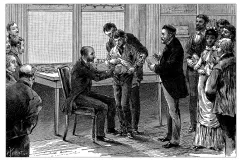
The doctor in literature
The doctor has been portrayed in books from many different viewpoints: as a saviour, a fraud, a visionary or a symbol of the power of knowledge.
Often, literature has felt attracted by the figure of the doctor, who has been presented in different ways, frequently ranging between two extremes: the altruistic doctor, selflessly dedicated to saving their patients; or the opposite, the charlatan or quack interested in making money at any price with the suffering of the patients.
An example of the former is Doctor Benassis, presented by Honoré de Balzac in Le Médecin de champagne (The Country Doctor, 1833), an extraordinary being who invests all his energies in trying to improve the living conditions of his community. A view that is very different from the doctor we find in Le Malade Imaginaire (The imaginary invalid, 1673), Molière’s comedy in which the hypochondriac Argán dreams of being surrounded by doctors who help him to extend his life, even marrying the daughter of one of them. The medical profession seems to be one of the French playwright’s obsessions. In a previous farce, Le Médecin malgré lui (The Doctor Despite Himself, 1666) he had already allowed himself to satirise the profession, showing a good-for-nothing, drunk lumberjack who manages to pass himself off as a doctor in a strangely convincing way.
A romantic double view
This Romanticism would continue with this dual view. The promethean myth matches the artistic creator and the scientist, representing them as empowered beings, free from all submission to the divinity, true masters of their destiny. This was confirmed by the poet Novalis, when he wrote that “poetry is the great art of building transcendental health”. In this way, the romantics dream with a world free from restrictions, in which the doctor will take charge of healing our bodies, while the artist will breathe life into the soul. But the so-called Gothic Romanticism, together with the gruesome horror stories, would fascinate people with the darkest reverse of Prometheus. The doctor, and by extension, the scientist would then turn into the one who committed the sin of hubris (or disproportion), by wanting to emulate God himself, irresponsibly playing at creating life, as Dr. Frankenstein does in the famous novel of the same name (1818) written by Mary Shelley.
Commitment when faced with suffering
Existentialism is a humanism, as Jean-Paul Sartre explained. Therefore, in spite of the fact that this artistic and intellectual movement confirms the absurdity of existence, it also affirms the possibility that the human being may endow it with sense. This is what happens in La Peste (The Plague, 1947), by Albert Camus, where we discovered the humanitarian solidarity of the doctors during the plague epidemic that scourged the Algerian city of Oran.
Another different view, although particularly deep, is offered by Thomas Mann in the philosophical novel Der Zauberberg, (The Magic Mountain, 1924). The sanatorium here becomes a metaphorical limbic space, which is used to cover the great subjects of love, illness and death. The main character attends a conference by a doctor called Kokovski, which seems to be a reflection of Freud and also a type of spiritualist. In this way, the doctor once again becomes a mysterious figure, who craves reaching the comprehensive knowledge of the human being, even after death. The novel by Boris Pasternak, Doctor Zhivago (1957), returns to idealism, with a main character who is both doctor and poet and who will see how his life is disrupted by the turbulent times, from the First World War to the Russian Revolution, along with all their consequences.
Later on, other literary works have centred on describing the difficulties in the training phase or the ups and downs of the medical profession in very different works such as The House of God (1978) by Samuel Shem, a contra-cultural satire about the daily life of the inmates of a hospital; or the best seller The Physician (1986), by Noah Gordon, which takes up the conflict between religion and science, following the steps of a young man who aspires to become a doctor in 11th century England.



